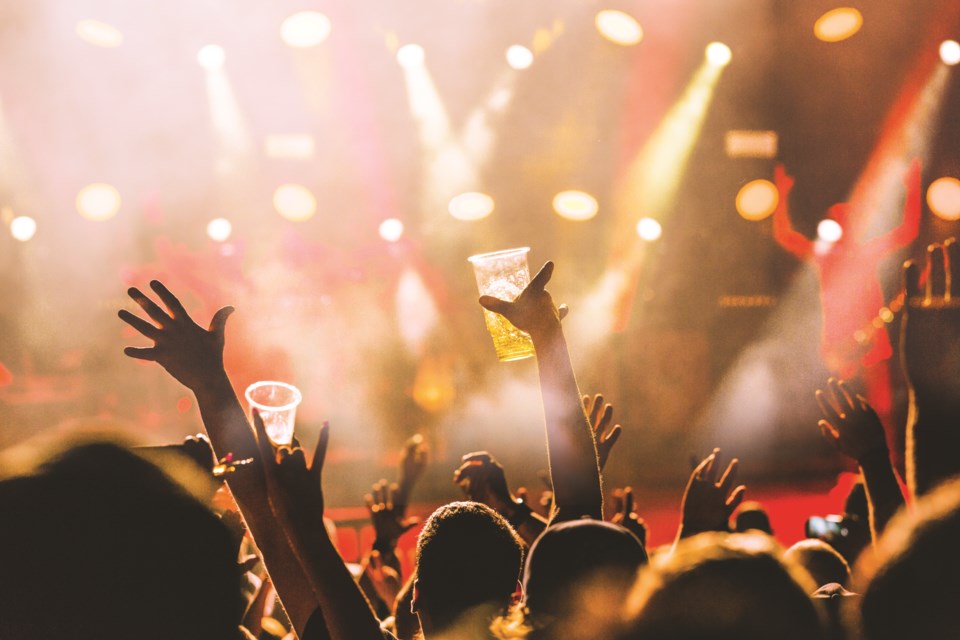Like a lot of kids before and since, Will Ross had posters on his wall as a teenager of his musical icons. In his case, it was Jim Morrison and Kurt Cobain, two revered, gone-too-soon rockstars known arguably as much for their musical genius as their prodigious consumption of pretty much any intoxicating substance they could get their hands on.
“Growing up as a youngster, we idolized the rock ‘n’ rollers, we idolized the ones who were partying all the time,” says the Squamish folk rocker, beatboxer and 2014 winner of the Whistler Music Search. “They were the influential rockstars I looked up to and I wanted to be just like them. Then as you get a little bit older, you realize, wait a minute, maybe I don’t want to be like them at all.”
It was a revelation hard earned by Ross, a regular on the Sea to Sky music circuit who decided to go sober eight months ago. Interestingly, it wasn’t the pubs and clubs, with their free bar tabs and hard-drinking party atmosphere, that inspired him to ditch the booze, but the loss of his consistent gigs at the height of the pandemic.
“Funny enough, it was the lack of playing and not knowing what to do with myself that had me drinking more at home and made me want to do it,” he says.
But there’s no denying the temptation of the music scene. Substance use is not only baked into the culture, but there’s the prevailing notion that it is necessary to reach one’s creative heights.
“I thought my mojo was gone, but you find a new kind of mojo,” Trey Anastasio, guitarist for renowned jam band Phish (and one of Ross’ musical heroes), told GQ in a 2019 article about musicians that have turned to sobriety.
“I was someone who held a similar belief, but I think it had to do with insecurities. It had to do with the inner child not feeling good enough,” says hip-hop artist and songwriter Meaghan “Lozen” Mullaly.
“Initially when I was playing sober, I forgot lyrics and it was because I wasn’t used to doing it like that,” she says. “These things that I buried, I didn’t realize I was doing all that when I was on drugs and alcohol. I didn’t realize that’s what I was doing and I had all these deep-seated wounds and stuff. I was just having fun and partying and playing music, but when I took that out and it was just me on the stage, all that stuff came out.”
Adding to the pressure inherent to the music scene is Whistler itself, a town that has never shied away from imbibing.
“Whistler has what we call a culture of acceptance around drugs and alcohol,” explains clinical counsellor Greg McDonnell.
“Part of the job of a musician is to get the alcohol flowing a bit and make everybody feel happy. If the artist wants to be sober, you gotta find a way of doing that that works for you. So yes, you might be playing fun-loving tunes and everyone’s getting happy and spending money, but you’re not—and that’s OK.”
That never seemed to be much of an issue for long-time Whistler DJ Ace Mackay-Smith (a.k.a. Foxy Moron), who got in the habit of performing sober as a go-go dancer at Tommy Africa’s. (She will still have a drink or two before DJing—if the venue is covering it. “It’s hard when you know it’s free,” Mackay-Smith says. “Maybe that’s my cheap side.”)
“We really did dance hard; it was like a full-on workout. We danced 40-minute sets four times a night. We sweat out of our calves, even!” she says. “If we drank on that job, I would always feel sick. It’s like doing a tequila shot and then going for a workout.”
Mackay-Smith quickly realized at gigs that, surrounded by mostly intoxicated people, she had the freedom to let loose and really be herself.
“I realized I could still be goofy and silly and do all the things people would normally do when they’re drunk, and nobody remembers anyway because they’re drunk!” she exclaims.
Inspired by the raves she attended in California, Mackay-Smith also organized the all-night Heaven parties for several years at the World Ski and Snowboard Festival, which were alcohol-free, partly because it meant the event could run until the wee hours, and partly because she wanted the immersive music and art installations to be the focus.
“That’s what I loved about those parties back then. The first raves I went to were in Los Angeles and they created such an experience that you didn’t even think about where the bar was,” she says.
Describing herself as “sober-ish,” Mullaly mostly left the Whistler club scene behind after she found the grind of performing night-in and night-out starting to wear on her.
“For me, it just came to the point where I was falling apart … My body was suffering,” she says. “When my parents came to visit me, I was in a ball, I was having ulcers and a whole slew of health problems. But I look at it as a blessing because I wasn’t honouring my body. I was like a lemming just doing what everyone does.”
The good news is that the music scene at large seems to be more open about discussing the pitfalls of the industry, and there are plenty of examples of artists going clean and still enjoying successful careers.
“For a lot of artists there comes a time or a passing in life where you just have to put that by the wayside because it will either take control of you or kill you,” Ross says.
“I’m not advocating if you’re playing music that you should stop drinking or doing what you’re doing. But if it gets to a point where you wake up feeling like shit, or get yourself into trouble, and you don’t want to do it anymore, there are ways out.”






